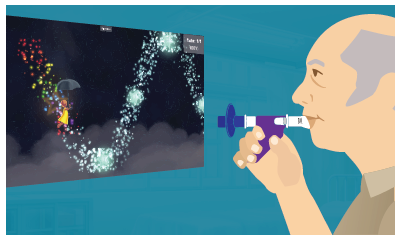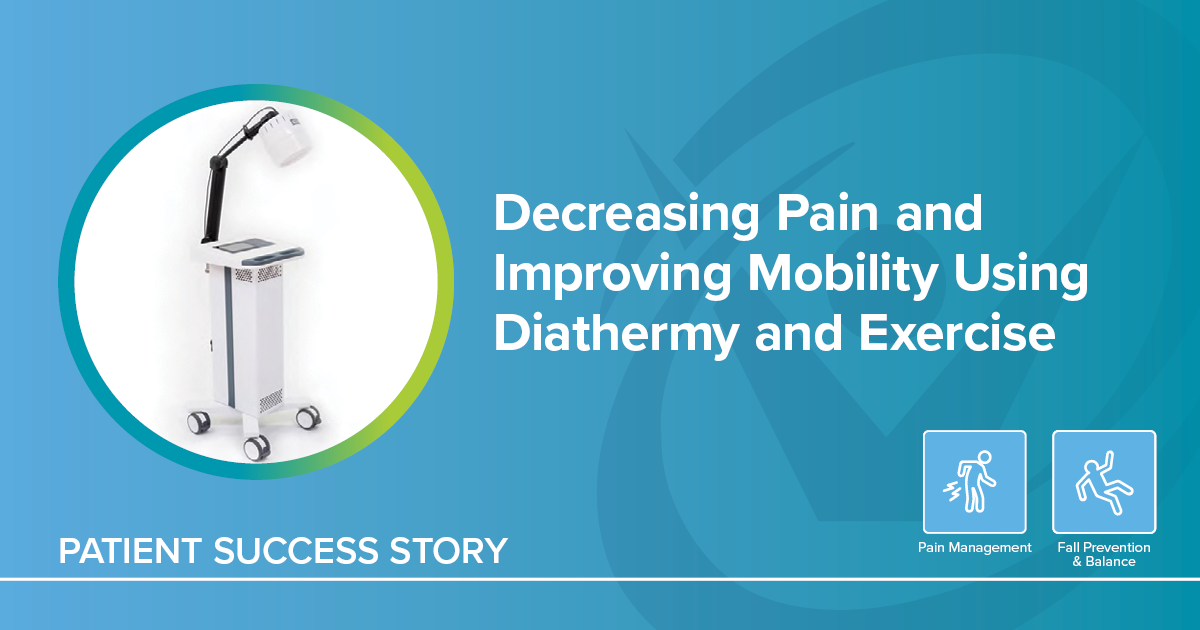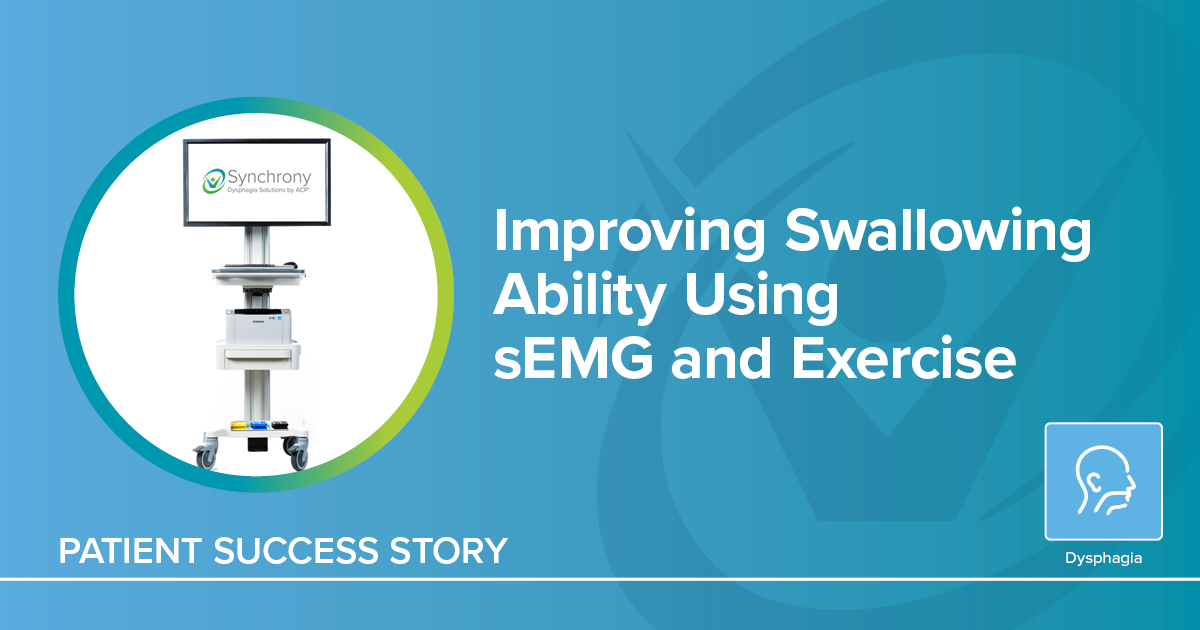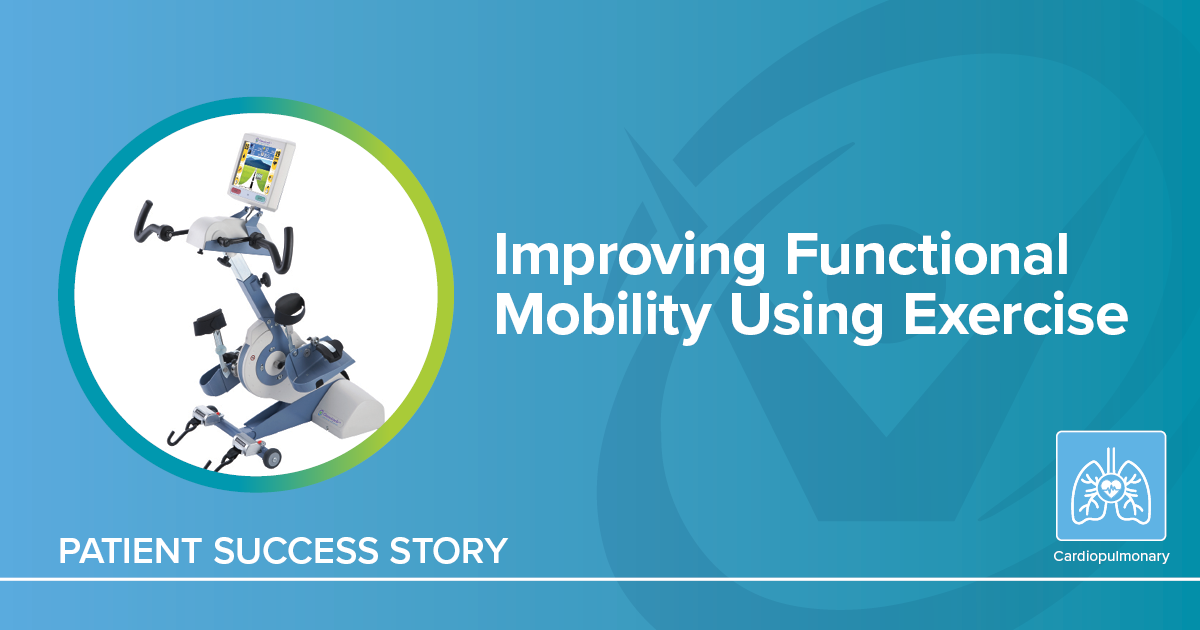According to the CDC, each year in the United States more than 795,000 people suffer a stroke and it is the leading cause of serious long-term disability. Individuals who suffer a stroke may have muscle weakness throughout the body including muscles of respiration and swallowing. They also may have compromised endurance, poor balance, and increased dependency with mobility and activities of daily living which greatly impact their quality of life.
ACP - Accelerated Care Plus
Recent Posts
Rehabilitation of Individuals Post-Stroke
Topics: Clinical Tip, Neuro Rehab
Improving Speech and Swallowing Ability Using Electrical Stimulation, sEMG, and Exercise
Patient Information: Female, Age 62
Diagnosis: Stroke / Oral Dysphagia (difficulty swallowing)
History: This woman was referred to outpatient speech therapy services due to continued deficits in her ability to speak, eat, and drink following a stroke seven months prior.
Topics: Dysphagia, Patient Success Story
Improving ADL Performance and Independence in Chronic Conditions
According to the CDC, 78% of adults over 55 in the U.S. have one or more chronic conditions. The ability to perform activities of daily living (ADLs) such as transfers, dressing, and bathing along with instrumental activities of daily living (IADLs) such as shopping, cooking, and cleaning informs healthcare professionals regarding the individual’s level of independence. With chronic conditions such as COPD, chronic heart failure, stroke, and diabetes, individuals may have dyspnea, weakness, and poor aerobic capacity which in turn may lead to impaired ability to perform ADLs and IADLs.
Topics: Clinical Tip, Cardiopulmonary
Decreasing Pain and Improving Mobility Using Diathermy and Exercise
Topics: Fall Prevention & Balance, Pain Management, Patient Success Story
Improving Swallowing Ability using sEMG and Exercise
Patient Information: Female, Age 73
Diagnosis: Closed Head Injury / Intellectual Disability / Oropharyngeal Dysphagia
History: This woman, born with intellectual disability, was referred to a skilled nursing facility for rehabilitation services following hospitalization due to a fall at her group home, which resulted in a head injury and femur fracture. Prior to her fall, she lived in a group home with caregivers, was non-verbal, and consumed a regular diet with thin liquids. However, caregivers modified her diet to soft solids due to noted occasional difficulty in chewing and swallowing.
Topics: Dysphagia, Patient Success Story
Rehabilitation for Individuals with Pulmonary Conditions
Respiratory diseases are among the leading causes of death and disability in the United States. In 2019, chronic lower respiratory disease including asthma, but predominately chronic obstructive pulmonary disease (COPD), was the 4th leading cause of death and influenza and pneumonia the 9th leading cause of death (Kochanek et al., 2020). The ranking for 2020 will likely change due to COVID-19-related deaths at greater than 500,000.
Topics: Clinical Tip, Cardiopulmonary
Improving Functional Mobility Using Exercise
Patient Information: Female, Age 85
Diagnosis: Chronic Heart Failure (CHF) / Chronic Obstructive Pulmonary Disease (COPD) / Muscle Weakness
Topics: Patient Success Story, Cardiopulmonary
Improving Swallow Ability with Electrical Stimulation and Exercise
Patient Information: Male, Age 71
Diagnosis: Guillain-Barré Syndrome / Oropharyngeal Dysphagia
History: This gentleman was referred to a skilled nursing facility for rehabilitation services after a 3-month hospital stay. He was visiting his son in the United States from Venezuela when he began experiencing numbness in his legs. He was hospitalized and diagnosed with Guillain-Barré Syndrome (rare autoimmune disorder that causes rapid and unexpected muscle weakness). While hospitalized he experienced multiple complications including infection, being placed on a ventilator, and placement of a feeding tube. Prior to his hospitalization he lived independently and ate a regular diet.
Topics: Dysphagia, Patient Success Story
Advanced Technology and Biophysical Agents to Address Balance Impairment
According to the CDC, falls are common among older adults with 36 million occurring each year and more than 8 million requiring medical attention. Among those with Parkinson’s disease, diabetes, stroke, and those experiencing impaired strength, coordination, and balance after prolonged hospitalization falls are also common. Individuals with or recovering from COVID-19 may also have these impairments and are at an increased risk of falls.
Accelerated Care Plus Announces Exclusive Partnership with Current Health
Collaboration to provide ability to monitor, manage and analyze vital signs from post-acute care patients
RENO, Nev. – Dec. 1, 2020 – Accelerated Care Plus (ACP), a Hanger, Inc. (NYSE: HNGR) company, today announced a partnership with Current Health, a global leader in remote healthcare delivery. ACP, the nation’s leading provider of specialized rehabilitation technologies and evidence-based clinical solutions for post-acute providers, will distribute Current Health’s remote monitoring platform, co-branded as OmniVitals Powered by Current Health, to the post-acute care market through ACP’s network of more than 7,000 post-acute care facilities.







